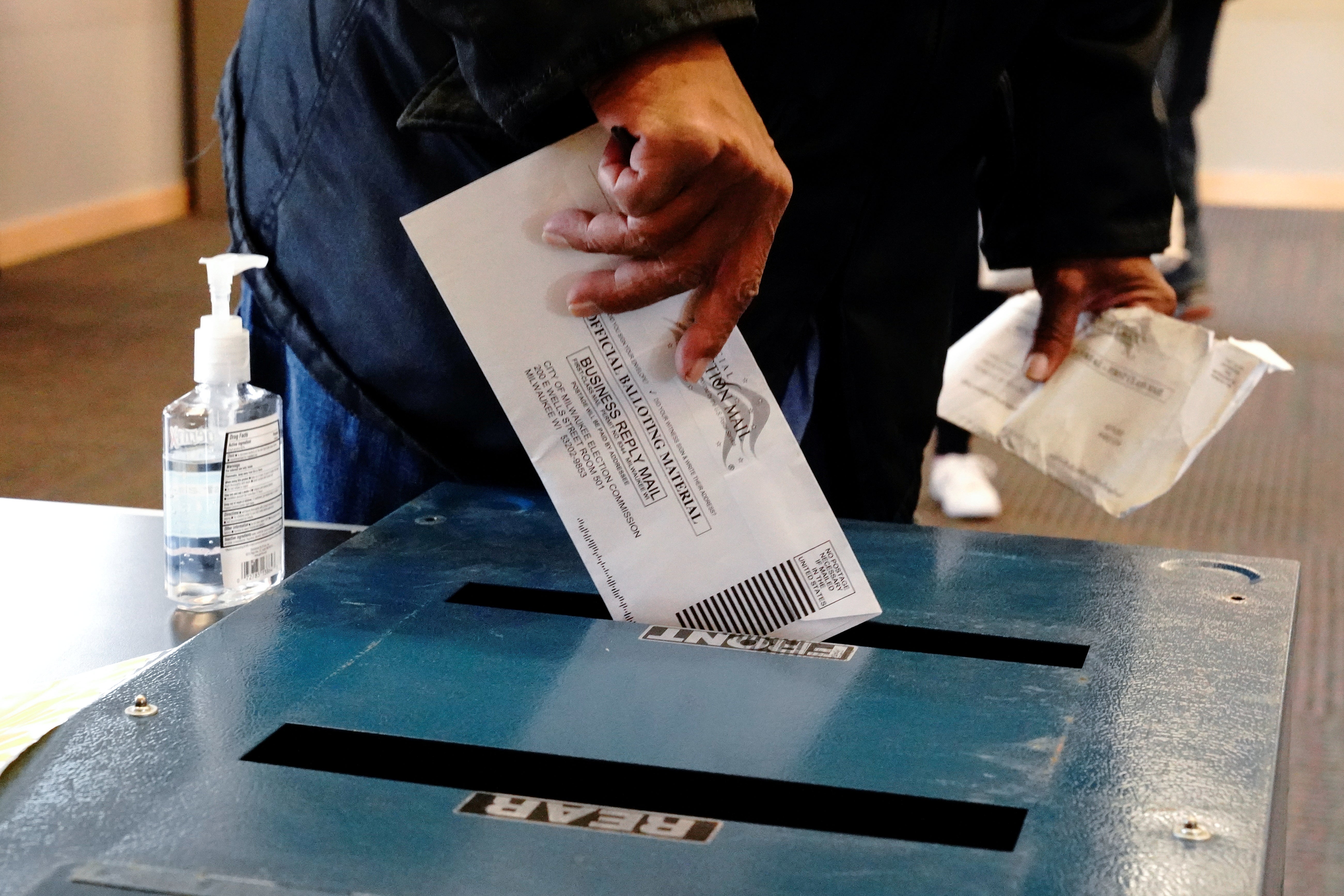
Moments before Amy Coney Barrett was confirmed as Donald Trump’s third appointee to the US Supreme Court, a divided ruling from the nation’s highest court said that mail-in ballots in Wisconsin that arrive after Election Day, even if they’re post-marked in time, are invalid.
The court’s decision on Monday blocked a federal judge’s order that allowed election officials to continue counting mail-in ballots that were postmarked by Election Day on 3 November and received no later than 9 November, following a coronavirus pandemic that has altered voting capacity as delays continue to plague the US Postal Service.
Voting rights advocates and legal analysts fear that conservative Justice Brett Kavanaugh has signalled the conservative majority court’s willingness to stop counting ballots on election night – and overrule state decisions to expand ballot access.
Justice Kavanaugh argued that state courts "do not have a blank check to rewrite state election laws for federal elections” and suggested that “chaos and suspicions of impropriety” would follow if “thousands of absentee ballots flow in after election day and potentially flip the results of an election.”
In her dissent, Justice Elena Kagan argued that results don’t “flip” if not all votes are counted.
“Nothing could be more ‘suspicio[us]’ or ‘improp[er]’ than refusing to tally votes once the clock strikes 12 on election night," she wrote.
The president won Wisconsin by fewer than 23,000 votes in 2016.
"On the scales of both constitutional justice and electoral accuracy, protecting the right to vote in a health crisis outweighs conforming to a deadline created in safer days,” Justice Kagan wrote.
More than 1.6 million votes have already been cast in the state during early voting, with more than 1 million votes cast from absentee ballots. Roughly 700,000 mail-in ballots have not been returned to election officials yet.
Minutes after the court’s decision, the president had falsely claimed on Twitter that there are “big problems and discrepancies with Mail In Ballots all over the USA.”
He said that the US “must have final total on November 3rd.”
Final vote counts have never been completely tabulated and certified on election night, and unprecedented requests for mail-in ballots during 2020 elections will likely mean the results take longer to produce.
The president has frequently and falsely pointed to procedural delays as evidence of voter fraud. If early ballot returns suggest a Trump victory, and delayed mail-in ballots begin to favour his Democratic rival Joe Biden, voting rights advocates have warned that the president could allege mass voter fraud to justify undermining the result.
In his opinion, Justice Kavanaugh cited an article from New York University law professor Richard Pildes, stating that the “longer after Election Day any significant changes in vote totals take place, the greater the risk that the losing side will cry that the election has been stolen.”
But Justice Kavanaugh had selectively pulled from the article, which ultimately encourages states to extend their ballot deadlines to prevent such a case.
He also approvingly cited a radical theory from Bush v Gore, which decided the fate of the 2000 election between candidates George W Bush and Al Gore.
Justices Kavanaugh and John Roberts and incoming Justice Barrett were all part of the legal team that ultimately gave President Bush a slim victory for the White House, by just 537 votes among 6 million cast in Florida in that election.
That legal team had also argued in that case that late-arriving ballots without postmarks should be counted in Florida.
In a footnote in Monday’s ruling, Justice Kavanaugh argued his support for a controversial idea that was considered too extreme by the court’s majority in 2000.
Chief Justice William Rehnquist and conservative justices Antonin Scalia and Clarence Thomas had argued that state legislatures, not courts, interpret changes to state election laws, to be governed by the Supreme Court, effectively creating a superseding elections board to determine the “intent” of state election laws.
Justice Kavanaugh cited their idea as precedent.
Challenges to expanded mail-in voting access across the US have come from Republican lawmakers and GOP officials in states, while Democrats and civil rights groups have fought to secure voting access.
“The state courts do not have a blank check to rewrite state election laws for federal elections,” Justice Kavanaugh wrote.
He said state courts “may not depart from the state election code enacted by the legislature.”
In his concurrence, Justice Neil Gorsuch echoed Justice Kavanaugh: “The Constitution provides that state legislatures – not federal judges, not state judges, not state governors, not other state officials – bear primary responsibility for setting election rules.
Chief Justice Roberts suggested he does not agree with the two justices – but the arrival of Justice Barrett a week before Election Day could give the court a majority to strike down state Supreme Court rulings that expand voting rights and ballot access.
North Carolina Republicans – who will soon face the Supreme Court with their own challenge to ballot deadlines in the state – said that Justice Kavanaugh’s remarks “succinctly captured the essence of the problem with unelected state panels or judges changing laws passed by a state legislature to govern an election.”







